 In an essay titled 'Red Face' Does Not Honor Us (Snag Magazine, 2/1/05), H. Mathew Barkhausen III explains a basic problem with Chief Wahoo, the Washington Redskins, and other red-faced stereotypes:
In an essay titled 'Red Face' Does Not Honor Us (Snag Magazine, 2/1/05), H. Mathew Barkhausen III explains a basic problem with Chief Wahoo, the Washington Redskins, and other red-faced stereotypes:
 In an essay titled 'Red Face' Does Not Honor Us (Snag Magazine, 2/1/05), H. Mathew Barkhausen III explains a basic problem with Chief Wahoo, the Washington Redskins, and other red-faced stereotypes:
In an essay titled 'Red Face' Does Not Honor Us (Snag Magazine, 2/1/05), H. Mathew Barkhausen III explains a basic problem with Chief Wahoo, the Washington Redskins, and other red-faced stereotypes:
Often times, as Native Americans we face the attitude, "Well, the ‘Redskins,' I guess that is kind of racist, I'll give you that one, but come on the ‘Indians' that's not so bad." True, the term "Redskins" is well known to be a racist term, equivalent with the likes of "Nigger," "Kike," "Chink" or "Gook." But while it's not really seen to be a big deal that a team call itself the "Redskins," no one would ever dream of calling one the "Gooks." But both are known to be racist, so why is one okay? There are teams throughout the country named after Native peoples or aspects perceived as representative of our cultures. But one does not find the same to be true of any other race in the country.
If the Cleveland "Indians" is okay, then why wouldn't the Cleveland Chinese be okay? I mean, calling someone Chinese, if they are indeed Chinese, isn't racist. So rather than the fans painting themselves up in "red face" to pretend to be Indians, they could put on "yellow" make-up and buy straw "coolee hats" to wear to games. Rather than doing the "tomahawk chop" during the sporting event they could do the "karate chop" (even though Karate is an Okinawan Art, but hey, all those Orientals look the same right?) Oh, and even better, when they play music to get the fans pumped they could have an Anglo mascot dressed in clothing perceived to be stereotypically Chinese, doing fake martial arts movements on the field, while the band plays "Everybody Was Kung Fu Fighting."
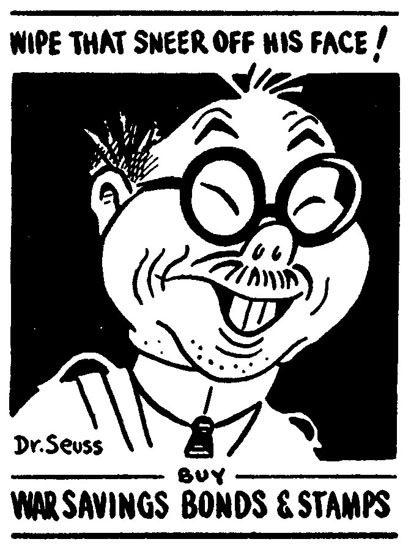
Naturally, since the team would be named the "Chinese" and not the "Chinks" this would not be viewed by ANY Chinese Americans as being in the least way offensive, right? Wrong. In fact, such an outrage would probably be met with swift retaliation by Asian American anti-defamation organizations. Just as they got the racist "Kung Fool" Halloween costume pulled from the shelves of stores throughout the country, they would put an end to the outrage. But maybe that's just because Asian Americans seem to care more about themselves and the psychological well-being of their children than others.
Jody David Armour, lawyer, professor, and author of Negrophobia and Rational Racism, once confronted his students with the Chief Wahoo stereotype. As he explained:
I am a rabid baseball fan and grew up in Cleveland, Ohio. However, I have never attended a baseball game in my hometown since I've been an adult because of the degrading, grinning caricature of Native Americans emblazoned on the uniforms and other team-related merchandise for the Cleveland Indians. When I taught back in that region, I used to first show my class some black Sambo caricatures and ask for their responses; they uniformly found them repugnant. Then I would place the Cleveland Indian caricature next to the ones of Sambo and ask what was the difference. They would start to squirm, for many of them were Indians baseball fans and had themselves owned memorabilia of the team and its "mascot." It's telling that we have come to the point in this country that African American caricatures are unacceptable but ones of Native Americans still generally unobjectionable. We've still got a lot of work to do!
If Armour's point isn't obvious, perhaps you've seen a poster or drawing featuring four Chief Wahoos, with three of them recast as other minorities. The labels say "Cleveland Niggers," "Cleveland Chinks," "Cleveland Kikes," and "Cleveland Redskins." If people don't get the message from that, I'll concede they're stupid...brainwashed...intellectually blind. Beyond hope, in other words.
More good examples
Boyle: German state university features teams named "Fighting Jews," mascot named "The Rabbi."
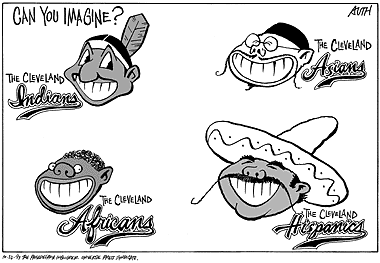
Times change...slowly
Fortunately, some people have started to catch on:
City ponders official Wahoo ban
White 'sensitive' to critics of Indians' logo
Friday, August 18, 2000
By Mark Vosburgh and Christopher Quinn
Plain Dealer Reporters
Denouncing Chief Wahoo as a racist caricature, Mayor Michael R. White has proposed stripping the Cleveland Indians' logo from all city-owned property.
White and top aides first disclosed their disgust with the baseball team's depiction of a red-faced, hooked-nose American Indian in a flurry of electronic messages in May and June. "The mayor believes [and I agree] that it is an offensive, racist symbol, and doesn't want to support it on city property," Executive Assistant Reuben Sheperd wrote in one e-mail message.
The mayor's office appeared to back away from its position yesterday, when spokesman Brian Rothenberg said White had made no decision on a Wahoo ban.
"This administration has always been sensitive to characterizations of any racial or ethnic stereotypes," White said in a prepared statement.
Rothenberg could not say whether Chief Wahoo appears on city buildings other than Cleveland Browns Stadium, where the logo periodically flashes on electronic message boards owned by the Cleveland Browns.
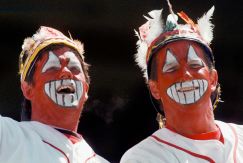
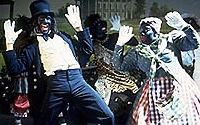
Even the possibility of the city condemning Wahoo drew praise from Native American leaders, who often protest against the logo. The logo has been used by the team -- in evolving designs -- since 1948.
"Wow, it was a long time coming," said Faye Brings-Them, president of the 500-member Lake Erie Native American Council. "We have been waiting for generations here. But we never gave up."
Robert Roche, director of the American Indian Movement, said the proposed policy is long overdue.
The Cleveland Indians declined to comment.
©2000 THE PLAIN DEALER.
Resistance remains
Unfortunately, others may never catch on:
Filmmaker screens attack on Tribe's Chief Wahoo
2006-11-02
By Bryant Greening Athens NEWS Campus Reporter
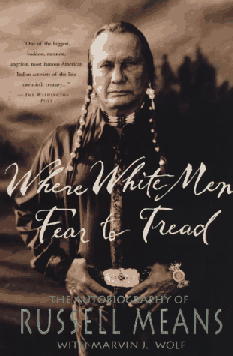
Major League Baseball's Cleveland Indians seemingly have more opponents than the rest of their American League foes. Ohio University's Multicultural Programs hosted a filmmaker Tuesday night who explained the negative effects the baseball team's name and mascot have on society.
Dennis Atkins, a native of Cleveland, screened his documentary, "WaWHO? Nothing is Sacred," to a half-full Baker Center Ballroom audience. The film featured numerous American Indian and human-rights activists aiming to rid the baseball club of what they argued is a racist name and logo.
Atkins, himself of American Indian descent, began the presentation by explaining the objective of the film. "(I wanted) to give a voice to the invincible people," he said. "American Indians felt no one would listen to them."
The filmmaker said that until his wife mentioned it to him a few years ago, he had not been concerned with the issues concerning the Cleveland Indians mascot. "I never really thought about Chief Wahoo," Atkins said. "But it took me about five seconds of looking at it to realize (the protesters) were right."
Atkins said Chief Wahoo, the team's logo, presents the American Indian as subhuman. The image, a red-skinned, cartoon-like figure with an oversized smile and a red feather in his hair, has been despised by the Native-American culture for decades.
"American Indians are angry," Atkins said. "They really feel it's institutional racism, and it's why nobody cares about them."
According to "The Baseball Reliquary" Web site, the Cleveland ballclub, "The Naps," renamed themselves the Indians in 1915, two years after the death of Louis Sockalexis, the first known Native American to play in the Major Leagues. Defenders of the team's name and logo say they honor Sockalexis.
Many anti-Chief Wahoo activists in the documentary also maintained that the Cleveland baseball team's name and mascot perpetuate an accepted racism against American Indians.
Ellen Baird, who was featured in the documentary, said the name and mascot promote an unfair stereotype.
Pointing specifically to Chief Wahoo, she said the logo mocks Native American culture, as the mascot's red eagle feather is typically awarded to a person wounded in war. "A baseball game is not a war," she said. "You don't hear this because of the institutional racism."
Joseph Meisner, who has helped support the American Indian movement in Cleveland as a legal aide, said most people who defend the baseball team's name and logo don't understand what it represents.
Atkins said he agreed with Meisner and added that most people who support Chief Wahoo argue that the name and logo actually honor American Indian culture. "Ignorance is used as an insult, but really it just means you don't know," he said. "A lot of society is just ignorant."
David Adams, who appeared in "WaWHO?," said white American culture cannot comprehend the idea that Native Americans would be degraded by images like the red-skinned caricature.
"Many (fans) will tell you that they are honoring American Indians every time they put on their hat," Adams said. "They simply don't get it."
On an Internet message board, in response to a May 7, 2006 Associated Press article about a Cleveland Girl Scout troop advocating for the elimination of Chief Wahoo, some respondents seemed to confirm Adams' charges. One respondent sarcastically called for the elimination of "The Simpsons"' Homer Simpson, because the character, the person said, pokes fun at white, working-class males.
The documentary also showed baseball fans dancing and yelling outside Jacobs Field, the Cleveland Indians' stadium, seemingly mocking Native Americans. Many American Indian advocates in the film said this would not be accepted if another minority group were the target of such ridicule.
Russell Means, an American Indian activist featured in the documentary, said he and others, including Meisner, sued the Cleveland Indians in 1972. The lawsuit, which called for the renaming of the club and elimination of Chief Wahoo as mascot, was settled out of court.
Means said that as a result of his part in the suit, Cleveland Indians fans sent him hate mail, some calling for the "ethnic cleansing" of American Indians.
The activist said he could not understand how a game could generate so much hate. "I've never attacked his home," Means said. "We (simply) long to be treated as human beings."
Atkins said people are often too passionate about sports. "Sports fans identify so strongly with teams that it's like you're attacking them personally" when advocates ask for names and mascots to be changed, he said.
In the end, Atkins and most of the people in the documentary said money is the ultimate factor in officials not eliminating the Cleveland Indians' name and mascot. One source in the documentary estimated that the club makes over $20 million a year from the Chief Wahoo symbol.
Atkins said the documentary is not intended to attack baseball or the Cleveland Indians' organization, but rather to educate and advocate for change. "(To date), nothing has changed," he said. "It's an issue of corporations. It's an issue of special interests."
Means was the most radical advocate in the film and extremely critical of the Indians baseball club. "You're never going to win a World Series, period. It's your karma," he said. "I've put a curse on you. I announced it with a lawsuit."
Chief Wahoo in the Stereotype of the Month contest
Birds & Blooms mag flaunts a Chief Wahoo birdhouse
Chief Wahoo doesn't hinder "full enjoyment" of a park
More on Chief Wahoo
The many meanings of "Wahoo"
Wahoo the board game
The most offensive racial icon
Kucinich loves Chief Wahoo
The bogus Cleveland Indians story
Why "Indians" teams are a bad idea
Clueless clinical psychologist
Spend eternity with Chief Wahoo
Real Indian beats pseudo-Indians
Wahoo = Sambo
The Cleveland Caucasians
The history of Chief Wahoo
Indians as living fossils
Chief Wahoo is no honor
Chief Wahoo to celebrate civil rights?
Chief WaWHO?
Related links
More on team names and mascots
Jody Armour's thoughts on why society must be color-conscious, not color-blind
|
. . . |

|
All material © copyright its original owners, except where noted.
Original text and pictures © copyright 2007 by Robert Schmidt.
Copyrighted material is posted under the Fair Use provision of the Copyright Act,
which allows copying for nonprofit educational uses including criticism and commentary.
Comments sent to the publisher become the property of Blue Corn Comics
and may be used in other postings without permission.